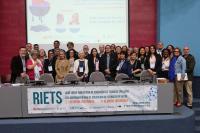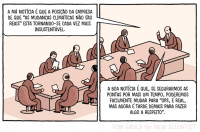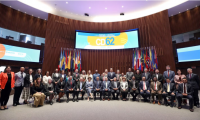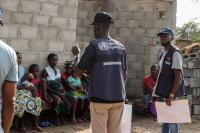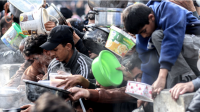You are here
News
-
11/10/2025 - Held on October 9 and 10, 2025, the 2nd Ordinary Meeting of the Ibero-American Network of Health Technicians Education (RIETS) was attended in Rio de Janeiro by representatives of institutions from 11 of the 22 countries in the community: Argentina, Bolivia, Brazil, Chile, Colombia, Costa Rica, El Salvador, Paraguay, Peru, Portugal, and Uruguay. In addition, several other institutional representatives followed the meeting via Zoom, with the aim of evaluating the network's performance and establishing its 2026-2028 Work Plan.
-
10/22/2025 - In 2021, the World Health Organization (WHO) stated that climate change is responsible for about one-quarter of all deaths worldwide — approximately 13 million each year. This highlights the urgency of addressing the issue. In the year of the 30th United Nations Climate Change Conference (Conference of the Parties – COP30), to be held in November in Brazil, it is only fitting to discuss the topic in connection with the training of health technicians. To this end, RIETS invited two experts in the field — researchers and professors Renata Gracie, from the Institute of Communication and Scientific and Technological Information in Health (ICICT/Fiocruz), and Alexandre Pessoa, from the Joaquim Venâncio Polytechnic School of Health (EPSJV/Fiocruz) — to participate in the seminar “Climate Emergencies and their Impacts on Global Health, National Health Systems, and the Training of Technicians,” the opening event of the Meeting.
-
10/06/2025 - The 62nd Directing Council of the Pan American Health Organization (PAHO) concluded today, setting a bold agenda to address pressing health challenges across the Americas through the approval of the PAHO Strategic Plan 2026–2031 and key resolutions aimed at expanding access to high-cost high price health technologies, and preventing and controlling noncommunicable diseases (NCDs).
-
09/25/2025 - As part of the First National Public Health Congress, “Health in All Policies,” organized by the Faculty of Medicine of the National University of Asunción with the support of the Pan American Health Organization (PAHO), Dr. Rômulo Paes de Sousa, researcher and professor, and Marcos Boulos, a renowned Brazilian infectious disease specialist, who gave keynote speeches on Health in All Policies and the One Health concept, respectively.
-
09/23/2025 - Following the declaration of the Ebola virus disease outbreak in the Democratic Republic of the Congo, Angola is intensifying surveillance, prevention, and preparedness measures against the disease, particularly in Lunda Norte province, which borders the DRC.
-
09/22/2025 - With the aim of building new partnerships to strengthen national health systems, one of the main legacies of the 1st Conference of the National Public Health Institutes (NPHIs) of the Brics is the creation of a permanent Network of the bloc’s NPHIs. The representatives of the countries reached a consensus in pursuit of solidarity and the sharing of experiences.
-
09/08/2025 - Today, the World Health Organization (WHO) has released updated editions of its Model Lists of Essential Medicines (EML) and Essential Medicines for Children (EMLc), adding new treatments for various types of cancer and for diabetes with associated comorbidities such as obesity.
-
09/07/2025 - The Executive Secretary of the Community of Portuguese-Speaking Countries (CPLP), Fátima Jardim, on Thursday in Portugal presented the strategic areas of her mandate with focus on Institutional Modernization, Transparency, and Strategic Partnerships.
-
09/07/2025 - At Africa Climate Week Gender Day in Addis Ababa, women advocated for fair access to finance and support for local solutions—from regenerative agriculture to clean energy—as key to bridging climate justice and women's rights.
-
09/03/2025 - More than half a million people in Gaza are trapped in famine, marked by widespread starvation, destitution and preventable deaths, according to a new Integrated Food Security Phase Classification (IPC) analysis.

